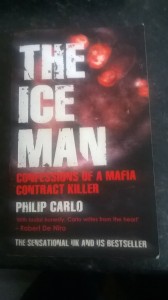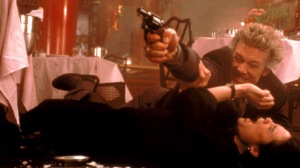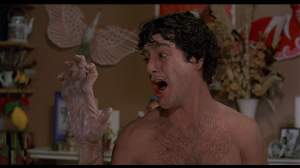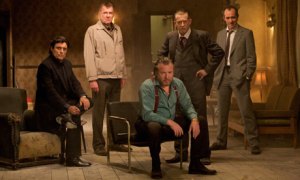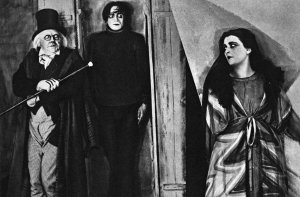Dinner For Two
CHARACTERS
Max
Eddie
[Enter a small, bare living room. MAX is running around franticly setting the table. He is in his mid-20’s. He has an apron and a cook’s hat on. He notices a stain on one of the glasses and vigorously wipes it with the back of his apron. The door knocks loudly three times.]
MAX: It’s open!
[A man in his mid 40’s enters the room. He is wearing a caramel suit and a homburg and has steeled rimmed glasses.]
MAX: Mr Byrne, I’m glad you could make it.
EDDIE: Max.
MAX: Would you like to take a seat?
[Eddie continues to stand and stares blankly].
EDDIE: Yes, I would like a seat. You hardly expect me to eat while standing, do you?
[Max laughs with insincerity]
MAX: Of course not.
[EDDIE takes off his hat and sits down rigidly. MAX walks off stage and comes back with pitcher of wine]
MAX: I hope you like red.
EDDIE: I don’t.
MAX: Oh.
[Both of them stare at each other for a second]
EDDIE: Is there a problem?
MAX: I beg your pardon?
EDDIE: Why are you standing there like a dog who just shat on the carpet?
[Max quickly looks behind him towards kitchen]
MAX: I think the steaks are done.
[Walks off stage, EDDIE talks loudly to him]
EDDIE: You do know I’m only here because ‘Shaughnessy’s’ is closed? You know that, don’t know?
MAX: Yeah, I heard about it. What happened to that again?
EDDIE: Some git left a fag lighting in one of the bins. Whole place is burned down. The old man has no insurance, can you believe that? Took it out and spent it all on the track, the poor bastard.
MAX: Jesus, that’s terrible.
EDDIE: Terrible? It’s an abomination. Man’s worked there his whole life, worked his weight in gold. Never got something for nothing, never got any breaks. Then all of it–gone, up in smoke.
[Max comes back with plates]
MAX: Stupid prick. He’ll be sorry when he’s picking up his teeth from a wheelchair.
EDDIE: You’ll see to that, won’t you Max? I’m doing you a favour here, so you can do me a favour. Your man Shaughnessy is a friend, good friend. I’d like to do it, but I’m a bit busy myself.
MAX: Yeah, I’ll find him, that’s no trouble.
[Pause]
MAX: Mr. Byrne—
EDDIE: Call me Eddie.
MAX: Eddie. I hope you don’t mind me saying this, but I’d appreciate it if you didn’t make this out as if it’s some sort of…I don’t know, chore.
EDDIE: Chore?
MAX: Well, we’ve been working together a long time. Just thought it would be a good thing to do. Get to know each other.
EDDIE: Jesus, what is this? A member’s only tea party? “Golly gosh, I’m sure glad you had me over, let’s go for a walk in the park afterwards. We’ll have some ice cream”. Do you want us to discuss philosophy over the fireplace, with caviar and smoking jackets and brandy—
MAX: I do have some brandy.
[Pause]
EDDIE: Well, that’ll do for starters… I know you might find this hard to believe Max, but I like you. I like your work. You’re thorough. All you have do is lose the pair of tits and I may like you a bit more. Come on, give me that steak before it goes cold.
[Two eat silently for a minute]
MAX: What do you think?
EDDIE: Well, I’m no culinary genius, but it’s a bit stringy.
[Max raises his eyebrows and continues eating].
EDDIE: So, do you have a girlfriend?
MAX: Something like that.
EDDIE: Oh yeah. You going to settle?
MAX: It’s early days yet. I love her but, I’m not sure. Just have to wait and see.
EDDIE: Be sure to get a move on. Don’t you want a dynasty?
MAX : Um…
EDDIE: Kids, whatever. The most important thing in life is to leave something behind.
MAX: I’ll drink to that.
EDDIE: I barely see the wife these days. If I’m not doing one thing for Vinnie, I’m doing another.
MAX: No time off. Its go, go, go.
EDDIE: Goddamn right. Goddamn right you’re right. You know, they say that the cops never sleep in this city. I say to hell with that, it’s the crooks who need their beauty sleep more than anyone else. [smiles wryly] Am I wrong?
MAX: You aren’t. I’m the same, like. Do you know that place on 57th street, the laundromat?
EDDIE: The chink joint?
MAX: Yeah, that’s the one. Son of a bitch has been stonewalling me for weeks. “No money! No money this week!” I just get sick of his crock of shit, I get one of the boys and we go and try and smash the place up. The guy’s in the corner, sobbing like a child. His wife comes out, she always looked like a tart. I thought she’d be nothing. Next thing I know, she pulls a .45, blows the other guy’s toes off. She’s firing like crazy, I’m ducked behind one of the machines. She’s screaming in whatever language. The other guy is scared shitless and, of course, I forgot to bring my snub. Left it at home.
EDDIE: Mistake.
MAX: Yeah. I just stop thinking, I make a break for the door, I hear the pig sirens. The rest was just a daze, I can’t even remember what happened. But it was crazy. I had to hide out for days, wait for everything to die down.
EDDIE: Such is the nature of what we do.
MAX: Tell me about it.
EDDIE: You should have a piece on you all the time.
MAX: I know. I hear you like to stockpile.
EDDIE: That don’t matter, I haven’t had an itchy trigger finger since high school. It’s in case those Reds come knockity knock knocking. Can’t be too careful.
[MAX smirks]
MAX: I take it you’re a fan of Joe McCarthy.
EDDIE: No, I don’t really like The Beatles all that much.
[MAX frowns slightly and looks down]
MAX: Me neither.
[ EDDIE pushes his half eaten plate across the table. MAX attempts to conceal offense].
EDDIE: Anyway Max, I’m going to level with you. I didn’t come here for the steak.
[More to himself]
MAX: I can see that.
[EDDIE doesn’t hear.]
EDDIE: I’ve got a little deal coming in. It’s a pet project of mine I’ve been doing on the side. You may be interested, you may not, I’m not sure. But there’s a lot of money to be made and I could use a bagman.
[Max leans forward with interest]
MAX: What kind of deal?
EDDIE: Heroin.
[Max attempts to respond but is immediately cut down]
EDDIE: I know, I know what you’re going to say. Vinnie doesn’t like it. Don’t talk to me, just listen. But it is the way of the future. If it’s controlled and regulated, it’s safe.
MAX: That’s a federal crime though. You’ll bring a lot of heat down on us.
EDDIE: Everyone’s going to look the other way once we keep their pockets lined, do a favour here and there to stay quiet. If you have to play someone, all you have to do is get music they want to listen to. It’s that simple. This is a big opportunity. I mean, you can’t cook for shit, but you’re good people. I can see that now. I want you part of this.
MAX: It seems very tempting, Eddie.
EDDIE: Look, let’s just forget about it now. We’re just talking, speaking about it. Sleep on it, see how you feel in the morning.
MAX: Yeah, sure.
[EDDIE nods slowly, then looks towards the kitchen]
EDDIE: You said you had brandy, didn’t you?
MAX: Yeah. I’ll get us two glasses.
EDDIE: You do that.
[MAX leaves to kitchen. EDDIE puts his feet up and looks around the room. MAX comes back]
EDDIE: Thank you.
[MAX looks towards desk behind EDDIE].
MAX: You know, I never showed you a picture of her.
[MAX walks to counter, EDDIE half-heartedly looks back]
EDDIE: Who?
MAX: My girlfriend.
[EDDIE, mildly disinterested, turns back towards kitchen]
EDDIE: Is she cute?
MAX: Very. I think you’ll like her.
EDDIE: Nice tits?
MAX: You could say that.
EDDIE: I do say that. Do you have any other way of putting it?
[EDDIE drinks slowly].
EDDIE: No offense. I’m sure she’s lovely.
MAX: None taken.
[MAX walks towards EDDIE who doesn’t look back. MAX is holding onto a snub nose and points it at EDDIE. He fires. EDDIE slumps over the table, his glass shatters on the ground. EDDIE is motionless.]
MAX: Mistake, Eddie.
[MAX moves the plates towards his end of the table. He then reaches into EDDIE’S pocket and pulls out his wallet. He strolls over to the phone and dials a number. He stares at EDDIE as he waits]
MAX: Vinnie, it’s Max. Yeah, it was him. He was in charge of the dope…Because he told me so… No, I took care of it. I can dump him upstate, I know a place…Yeah, I thought he’d never get relaxed…No, he didn’t like the steak.
CURTAIN

